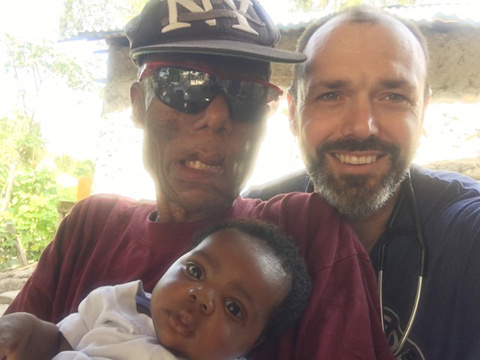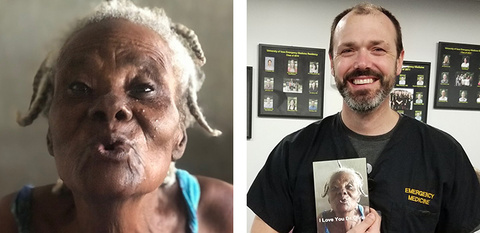
‘The village we work in used to see themselves as the poorest of the poor’ — Chris Buresh, MD
Emergency medicine physician Chris Buresh, MD, MPH, helps teams of health care providers and laypeople on trips to Haiti, having a hand in five medical trips and two surgical trips annually. The team sees about 1,300 medical patients each trip, or about 6,000 a year, and performs between 55 and 80 surgeries each year.
But the impact the team makes on the community goes beyond health care, says Buresh, who is also director of the Carver College of Medicine Graduate Medical Education International Committee.
“We also help with community development projects, which so far have included putting in a road, two deep bore wells, a recycling center, a solar-powered streetlight, over 100 latrines, over 1,000 water treatment units, and teaching basic neonatal resuscitation,” he says.
The team’s impact is wide. Medically, they’ve helped decrease the rates of diarrhea – the second-leading killer of kids in the Haitian community they serve – and have dropped early neonatal mortality rates from around 8 percent to 2.4 percent.
More importantly, Buresh says, is the change the team has seen in the community’s attitude.
“The village we work in used to see themselves as the poorest of the poor. At the market, all of the other villages would make fun of them,” he says. “They felt pretty hopeless and didn’t really feel like they had much control over their future.”
A smooch for Dr. Buresh from Haiti
Craig Dopf, one of the providers who frequently accompanies Chris Buresh on travels to Haiti, recounts this story.
“I have had the pleasure and privilege of providing healthcare in Haiti with Chris Buresh almost every year since and including the year of the earthquake. A few years ago Chris encountered an elderly frail Haitian woman who likely had multiple acute myocardial infarctions and was in chronic heart failure. We had no oxygen. Chris and I found an abandoned, pseudo hospital a few miles away. They did have an oxygen tank. We took the lady to that place and hooked her up with oxygen. Chris stayed up all night, by himself, at her side, successfully resuscitating her. As expected, he put in a full day’s work the following day.
“Last week I did a home visit with that same lady. She is too frail to climb the hill to our makeshift clinic. Otherwise, she is doing very well at home with her family. At the conclusion of my visit with her she asked me to give Dr. Chris a big hug and a kiss. I replied, with the assistance of a translator, ‘How about you pretend you’re giving Dr. Chris a big kiss. I’ll take a picture of you and give it to him.”

At left, the heart-felt kiss. At right, Dr. Buresh with a sincere thank you.
Buresh and his team spent several months meeting with community members in groups and in house-to-house surveys, documenting needs and things the community wanted to do. The projects that would be discussed in community meetings were the same projects the team would identify as needs in their surveys.
After about 18 months, members of the community approached Buresh and the team.
“They’d identified a need for more trees and better irrigation,” he said. “They’d typed up a proposal with a background, a rationale, pictures and supporting documents, and a budget. They’d gone from a community that felt powerless to a group that felt that they had the ability to affect their future.
“Now they complain because all of the people from surrounding communities keep moving to town,” he says.
The trips have also had an impact on Buresh, and the way he sees himself as a physician.
“I am way more aware of the ways that people’s context affects their health and the way they seek care,” he says. “I think I’m a lot less likely to see people as ‘non-compliant’ and a lot less likely to get frustrated when people make decisions that I would see as poor choices about their health. I’m a lot less judgmental than I used to be.”
“As someone who gets to work in education, I am grateful that I’m able to share some of these experiences and perspectives with people who are coming behind me,” he says. “Hopefully it is more valuable than pedantic for them.”